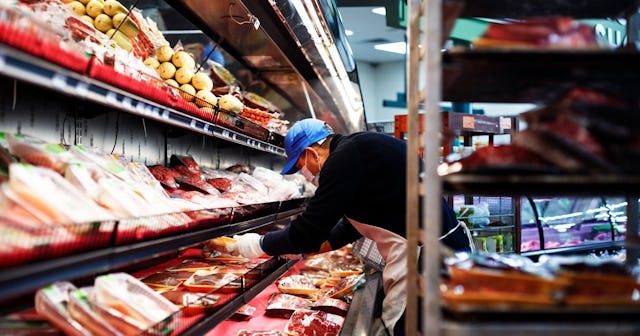Tyson Warns Of Meat Shortages Due To Covid

The knock-on effect for processing plants, farmers, and grocers is being felt nationwide
Tyson Foods, the world’s second-largest meat processor, is warning that “millions of pounds of meat” will soon disappear from the supply chain as food processing plants continue to close to allow for coronavirus testing (or because of an outbreak).
“The food supply chain is breaking,” chairman John Tyson said in a full-page advertisement published yesterday in The New York Times. Farmers don’t have anywhere to sell their livestock, Tyson said, which will result in “millions of animals — chickens, pigs and cattle” that will be “depopulated because of the closure of our processing facilities.”
There is evidence of this happening already. CNN reported farms in Delaware and Maryland are “humanely killing” two million chickens due to lack of employees at nearby food processing plants.
Tyson isn’t the only major meat processor that has been forced to close its doors. JBS USA and Smithfield Foods also had to close several plants because coronavirus cases have soared in recent weeks. JBS was just one of two pork processing plants in Minnesota to close because employees tested positive. When this happens, there is nowhere for farmers to sell livestock or produce.
According to The New York Times, more than 5,000 meat and food-processing workers in the US have been infected with or exposed to the virus, and 13 have died.
The food supply chain now hangs in a delicate balance. It’s not to say there is a food shortage, but rather no national coordination to get the food where it needs to be. In some areas of the country, there is an abundance of supply, and in others, massive demand but nothing to give.
This pandemic and resulting closures of restaurants, schools, and businesses are not just impacting the meat supply chain. According to NPR, dairy farmers in Wisconsin, Minnesota, and Georgia have had to dump thousands of gallons of milk (no schools or restaurants to sell to) and in Florida, vegetable growers are being forced to abandon fields of ripe tomatoes, yellow squash, and cucumbers.
“We cannot pick the produce if we cannot sell it, because we cannot afford the payroll every week,” says Kim Jamerson, a Florida vegetable grower. “We’ll have to tear ’em up. Just tear up beautiful vegetables that really could go elsewhere, to food banks, and hospitals, and rest homes.” Grocery retailer Publix is trying to do its part by buying up some of the produce from farms in the southeast and donating it to Feeding America food banks, but that is one grocer in one part of our very large country.
“There will be limited supply of our products available in grocery stores until we are able to reopen our facilities that are currently closed,” Tyson said.